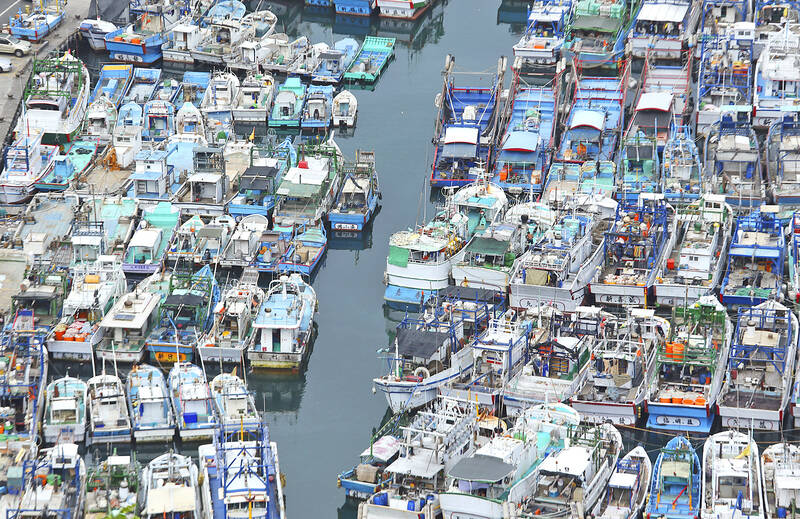The Fisheries Agency updated the US Department of Labor on its efforts to eliminate forced labor on Taiwanese fishing vessels at a meeting in Washington on Friday, it said yesterday.
Taiwanese seafood products were added to the US’ List of Goods Produced by Child Labor or Forced Labor in 2020, and the Fisheries Agency said it was hoping Washington would remove them from the next list, which is expected to be published later this month.
The labor department’s decision in 2020 came after 19 non-governmental organizations sent a letter to the department saying that “forced labor on Taiwanese longline fishing vessels continues unabated with little to no consequences.”

Photo: Wally Santana, AP
A delegation led by Fisheries Agency Director-General Chang Chih-sheng (張致盛) held a meeting with representatives from the department’s Bureau of International Labor Affairs on Friday, the agency said in a statement.
The meeting was titled the Taiwan-US Bilateral Consultation on Fishery Labor Rights and Benefits, the agency said.
The delegation shared Taiwan’s progress in improving fishers’ human rights, Fisheries Agency Deputy Director-General Lin Kuo-ping (林國平) said in Taipei yesterday.
The agency said it told US officials that the Executive Yuan on May 20 approved its Action Plan for Fisheries and Human Rights.
The action plan covers major strategies for bolstering labor recruitment processes and the management of foreign-flagged fishing vessels and recruitment agents, as well as improving the monitoring and management of living and working conditions on longline fishing vessels, the agency said.
To be taken off the department’s list, Taiwan would be expected to increase the number of labor inspectors and inspections, and implement additional measures to safeguard the welfare of fishers, it said.
The US hopes that the prevalence of forced labor can be reduced by implementing social protection programs and establishing migrant fisher unions, itthe agency said.
The delegation also visited Greenpeace’s US branch to convey Taiwan’s support for safeguarding the rights of migrant fishers, it said.
Greenpeace was one of the first to draw wider attention to claims of labor rights violations on Taiwanese-flagged longline fishing vessels in a 2019 report titled Seabound: The Journey to Modern Slavery on the High Seas.
Meanwhile, the agency released a revision to the Regulations on the Authorization and Management of Overseas Employment of Foreign Crew Members (境外僱用非我國籍船員許可及管理辦法), saying that the minimum monthly wage was raised from US$450 to US$550, while the insurance compensation limit for deceased crew members was increased from NT$1 million to NT$1.5 million (US$32,563 to US$48,844) and the maximum pay-as-you-go medical insurance compensation limit was set at NT$300,000.
The standard for minimum daily rest hours was also amended to be in line with the ILO C188 Convention for migrant fishers, the agency said.

Taiwan has received more than US$70 million in royalties as of the end of last year from developing the F-16V jet as countries worldwide purchase or upgrade to this popular model, government and military officials said on Saturday. Taiwan funded the development of the F-16V jet and ended up the sole investor as other countries withdrew from the program. Now the F-16V is increasingly popular and countries must pay Taiwan a percentage in royalties when they purchase new F-16V aircraft or upgrade older F-16 models. The next five years are expected to be the peak for these royalties, with Taiwan potentially earning

STAY IN YOUR LANE: As the US and Israel attack Iran, the ministry has warned China not to overstep by including Taiwanese citizens in its evacuation orders The Ministry of Foreign Affairs (MOFA) yesterday rebuked a statement by China’s embassy in Israel that it would evacuate Taiwanese holders of Chinese travel documents from Israel amid the latter’s escalating conflict with Iran. Tensions have risen across the Middle East in the wake of US and Israeli airstrikes on Iran beginning Saturday. China subsequently issued an evacuation notice for its citizens. In a news release, the Chinese embassy in Israel said holders of “Taiwan compatriot permits (台胞證)” issued to Taiwanese nationals by Chinese authorities for travel to China — could register for evacuation to Egypt. In Taipei, the ministry yesterday said Taiwan

‘LIKE-MINDED PARTNER’: Tako van Popta said it would be inappropriate to delay signing the deal with Taiwan because of China, adding he would promote the issue Canadian senators have stressed Taiwan’s importance for international trade and expressed enthusiasm for ensuring the Taiwan-Canada trade cooperation framework agreement is implemented this year. Representative to Canada Harry Tseng (曾厚仁) in an interview with the Central News Agency (CNA) said he was increasingly uneasy about Ottawa’s delays in signing the agreement, especially as Ottawa has warmed toward Beijing. There are “no negotiations left. Not only [is it] initialed, we have three versions of the text ready: English, French and Mandarin,” Tseng said. “That tells you how close we are to the final signature.” Tseng said that he hoped Canadian Prime Minister Mark Carney

POSITIVE DEVELOPMENT: Japan and the US are expected to hold in-depth discussions on Taiwan-related issues during the meeting next month, Japanese sources said The holding of a Japan-US leaders’ meeting ahead of US President Donald Trump’s visit to China is positive news for Taiwan, former Japan-Taiwan Exchange Association representative Hiroyasu Izumi said yesterday. After the Liberal Democratic Party’s landslide victory in Japan’s House of Representatives election, Japanese Prime Minister Sanae Takaichi is scheduled to visit the US next month, where she is to meet with Trump ahead of the US president’s planned visit to China from March 31 to April 2 for a meeting with Chinese President Xi Jinping (習近平). Japan and the US are expected to hold in-depth discussions on Taiwan-related issues during the